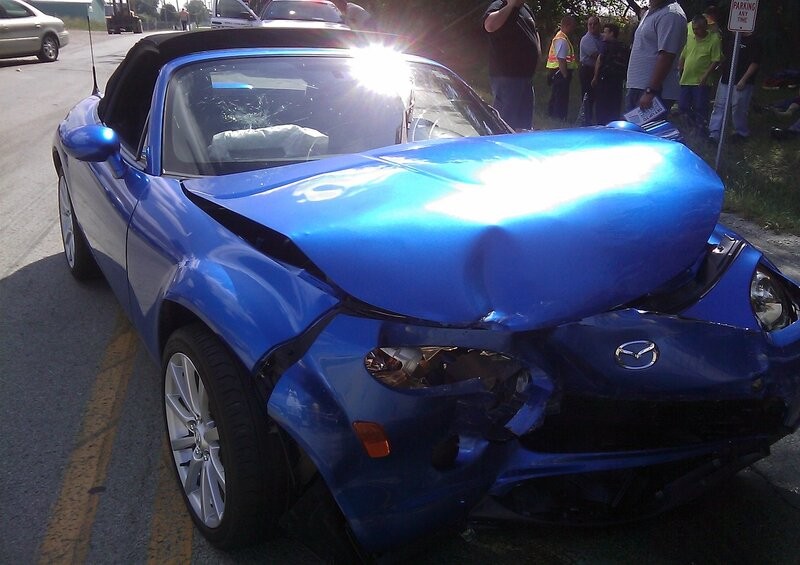Someone hit my car - Whose insurance do I call?

Being involved in a car accident can be a stressful experience, whether you're behind the wheel or return to find your parked car damaged. Knowing who to contact and how to handle the situation can save you time, money, and further frustration. In this handy guide, we'll cover what to do when someone hits your car, whose insurance to call, and the steps you should follow to make an insurance claim.
Immediately after the accident
When someone hits your car, the first thing you should do is ensure everyone’s safety. If anyone is injured, call emergency services immediately. Once safety is secured, gather as much information as possible from the scene. This includes exchanging names, contact numbers, addresses, and driving licence details with the other driver. Obtain the other party’s insurance company name and policy number, and note down the make, model, colour, and registration number of the other vehicle. Additionally, take photos of the scene, including vehicle positions, damages, road conditions, and any relevant traffic signs or signals. If there are witnesses, ask for their contact details in case their testimony is needed later.
Contacting your insurance company
You should always call your own insurance company as soon as possible, regardless of who was at fault. When you call, be ready to provide all the details you’ve gathered. Your insurance company will guide you through the claims process, which usually includes filing a claim, paying any excess (deductible) depending on your policy, and then having your insurer contact the other party’s insurance to discuss liability and determine who is responsible for covering the costs. Remember, your insurer is there to protect your interests, so make sure to report the accident even if you believe the other driver is at fault.
What if someone crashed into my parked car?
If your car is hit while parked, the steps are similar, but there are some additional considerations. First, if anyone was in the car or nearby, check for injuries and call emergency services if needed. If the other driver is present, exchange details as you would in any accident. If they are not, look for a note with their contact information, and if you find one, contact them to exchange insurance details. In the UK, you should notify the police within 24 hours by calling 101 if your parked car is damaged, especially if you can't identify who hit your car. If you only have third-party insurance, you might not be covered for repairs unless the other driver can be identified and found at fault. In cases where the driver is not found, you may need to cover the repair costs yourself unless you have comprehensive coverage.
What if someone hit my parked car and drove off?
Unfortunately, hit-and-run incidents are not uncommon. If someone hits your parked car and leaves without providing their details, there are a few steps you should take. Start by checking for CCTV cameras in the area that might have captured the incident. Also, look for any potential witnesses who might have seen the collision. Always report a hit-and-run to the police. They may not always be able to track down the driver, but a police report is crucial if you want to make an insurance claim. Before filing a claim, get an estimate for the repair costs. Depending on the quote, you can decide whether to claim through your insurance, which may increase your premiums. Having comprehensive coverage will protect you in situations like these, as your insurer will cover the damage even if the at-fault driver is not found.
What if a cyclist hit my car?
Collisions between cars and cyclists are often complicated because cyclists in many countries, including the UK, are not required to have insurance. If a cyclist hits your car, the first step is to check if they need medical attention and call for help if necessary. If the cyclist has insurance, exchange details, but if not, gather their contact information. If the cyclist is at fault, they may be liable for the damages, but if they are uninsured, you may need to pursue a claim against them personally. If the cyclist refuses to cooperate, or if the damages are significant, you should report the incident to the police. If the cyclist is under 18, you’ll need to get in touch with their legal guardian, who may be responsible for covering the damages.
How will this affect my insurance premiums?
Being involved in an accident, whether it’s your fault or not, can unfortunately lead to an increase in your insurance premiums. This is because insurers often view you as a higher risk after an accident, even if you were not at fault. However, there are ways to manage or minimise the impact on your premiums. Consider adding a no-claims bonus protection to your policy, which can help keep your premiums lower even after a claim. Some insurers offer telematics or black-box insurance, which monitors your driving behaviour. Safe driving can lead to lower premiums over time. If your premiums increase significantly after an accident, consider shopping around for a better deal. Use comparison tools like Quotezone to find the best policy for your needs.
Final thoughts
Accidents are never pleasant, but knowing what steps to take can help make the process of filing an insurance claim smoother and less stressful. Always prioritise safety, gather as much information as possible, and report the incident to your insurer promptly. Whether it’s a minor bump or a hit-and-run, understanding your insurance coverage and knowing how to navigate the claims process is essential to protecting yourself and your vehicle.
For peace of mind, ensure that your insurance coverage is comprehensive and up-to-date. If you're unsure about your coverage or looking to switch, compare quotes with Compare UK Quotes to find the right policy for your needs.
